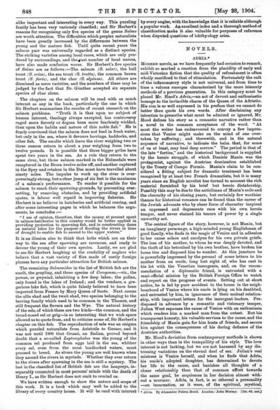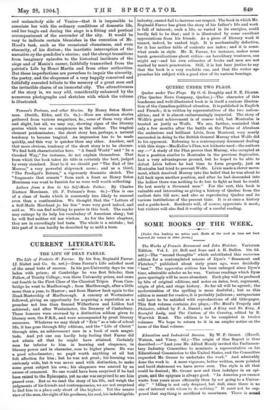ADRIA.*
MODERN novels, as we have frequently had occasion to remark, exhibit so marked a reaction from the placidity of early and mid-Victorian fiction that the quality of refreshment is often wholly sacrificed to that of stimulation. Fortunately the cult of the inflammatory style is not universal, and from time to time a volume emerges characterised by the more leisurely methods of a previous generation. In this category must be placed Mr. Hood's Adria,—an act of devout and enthusiastic homage to the invincible charm of the Queen of the Adriatic. His aim is so well expressed in his preface that we cannot do better than quote his own words. After disclaiming any intention to .prescribe what must be admired or ignored, Mr. Hood defines his story as a romantic narrative rather than a novel in the common acceptance of the word. "At most the writer has endeavoured to convey a few impres- sions that Venice might make on the mind of one over- taken by suffering ; and therewith, and in the natural sequence of narrative, to indicate the balm that, for some of us at least, may heal deep sorrow." The period is that of the late "forties," and the historical background is supplied by the heroic struggle, of which Daniele Manin was the protagonist, against the Austrian domination established by the Treaty of Campo Formio Maann's claim to be con- sidered a fitting subject for dramatic treatment has been recognised by at least two French dramatists, but it is many years since an English novelist has turned to account the rich material furnished by his brief but heroic dictatorship. Possibly this may be due to the anticlimax of Manin's exile and the obscurity of his closing years; but certainly few worthier themes for historical romance can be found than the career of the Jewish advocate who by sheer force of character inspired an oppressed and degenerate race with his own heroic temper, and never stained his tenure of power by a single unworthy act.
The central figure of the story, however, is not Manila, but an imaginary personage, a high-minded young Englishman of good family, who finds in the magic of Venice and in adhesion to her cause solace and anodyne for his own private griefs. The loss of his mother, to whom he was deeply devoted, and the theft of his betrothed by his own brother, have broken his home ties and disposed him to wander. At this juncture he is powerfully impressed by the perusal of some letters to his mother from an uncle, long lost sight of, who has cast in his lot with the Venetian insurgents, and, on the recom- mendation of a diplomatic friend, is entrusted with a semi-official mission by the British Foreign Office to watch and report on the progress of events. Setting out at short notice, he is led by pure accident to the house in the neigh- bourhood of Venice where his uncle is lying on his deathbed, and entrusted by him, in ignorance of their mutual relation- ship, with important letters for the insurgent leaders. Pre- disposed in advance by a romantic and visionary temper, Julian West espouses the cause of Venice with an enthusiasm which renders him a marked man from the outset. But his transparent honesty, his valuable services to the cause, and the friendship of Manin gain for him hosts of friends, and secure him against the consequences of his daring defiance of the Austrian authorities.
Mr. Hood's deviation from contemporary methods is shown in other ways than in the tranquillity of his style. The love interest is not lacking, but we are not harassed by any dis- tressing variations on the eternal duel of sex. Julian's real mistress is Venice herself, and when he finds that Adria, his uncle's adopted daughter, has determined to devote her life to the cause, and banishes all thoughts of a closer relationship than that of common effort towards the same goal, he acquiesces in her decision almost with- out a murmur. Adria, in fact, is so ethereal a personality —an incarnation, as it were, of the spiritual, mystical,
* Adria. By Alexander Nelson Hood. London : John Murray. flea. 6d. net.]
and melancholy side of Venice—that it is impossible to associate her with the ordinary conditions of domestic life, and her tragic end during the siege is a fitting and poetical accompaniment of the surrender of the city. It would be easy to indicate certain blemishes in the execution of Mr. Hood's task, such as the occasional clumsiness, and even obscurity, of his diction; the inartistic interruption of the narrative oy the gondolier's stories; and the abrupt transitions from imaginary episodes to the historical incidents of the siege and of Manin's career, faithfully transcribed from the patriot's Life by Henri Martin and from other authorities. But these imperfections are powerless to impair the sincerity, the poetry, and the eloquence of a very happily conceived and faithfully executed tribute to the memory of a great man and the invincible charm of an immortal city. The attractiveness of the story is, we may add, considerably enhanced by the numerous photographs and sketches with which the volume is illustrated.







































 Previous page
Previous page